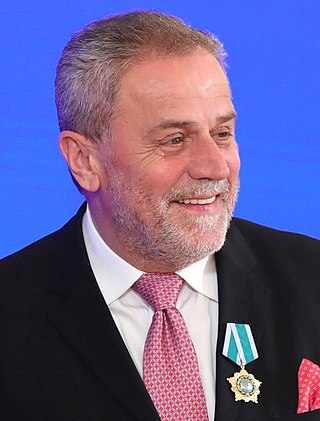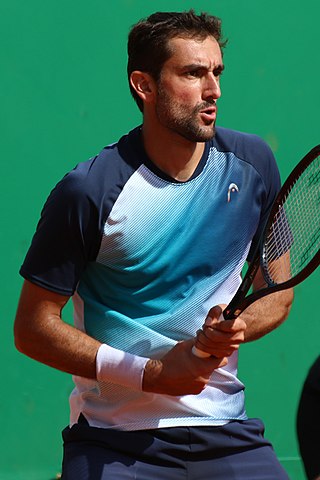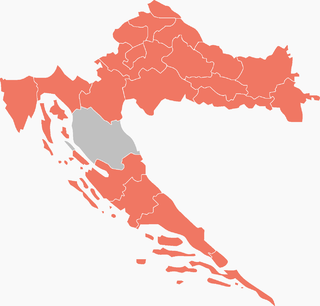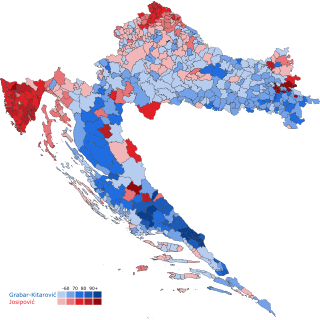| |||||
| Decades: | |||||
|---|---|---|---|---|---|
| See also: | |||||
The following lists events that happened during 2014 in the Republic of Croatia .
| |||||
| Decades: | |||||
|---|---|---|---|---|---|
| See also: | |||||
The following lists events that happened during 2014 in the Republic of Croatia .

Ivo Sanader is a Croatian former politician who served as Prime Minister of Croatia from 2003 to 2009. He is currently serving a 18-year prison sentence for corruption in Lipovica prison.

The Social Democratic Party of Croatia is a social-democratic political party in Croatia. The SDP is anti-fascist, progressive, and strongly pro-European. The SDP was formed in 1990 as the successor of the League of Communists of Croatia, the Croatian branch of the League of Communists of Yugoslavia, which had governed Croatia within the Socialist Federal Republic of Yugoslavia since World War II.
This is the history of Croatia since the end of the Croatian War of Independence.

Jadranka Kosor is a Croatian politician and former journalist who served as Prime Minister of Croatia from 2009 to 2011, having taken office following the sudden resignation of her predecessor Ivo Sanader. Kosor was the first and so far only woman to become Prime Minister of Croatia since independence.
Branimir Glavaš is a Croatian retired major general and politician. He was one of the founders of the Croatian Democratic Union (HDZ) party which was in power in the 1990s and one of its key figures until a split in 2006.

Milan Bandić was a Croatian politician and the longest-serving mayor of Zagreb, the capital of Croatia. Bandić was mayor almost continuously from 2000 to 2021, except during the time between his resignation in 2002 and the 2005 election. He was also suspended from exercising his powers and duties for several months after his 2014 arrest over a corruption scandal. Out of Bandić's multifaceted engagement in politics, the most noted part was his mayoralty of Zagreb, which followed the Croatian Democratic Union's (HDZ) first post-socialist period of government (1990–2000), and exacerbated many existing transitional problems in the city.
The Škabrnja massacre was the killing of 62 Croatian civilians and five prisoners of war by Serbian Autonomous Oblast Krajina Territorial Defence troops and the Yugoslav People's Army (JNA) in the villages of Škabrnja and Nadin east of Zadar on 18–19 November 1991, during the Croatian War of Independence. The massacre occurred shortly after an agreement to evacuate Zadar's JNA garrison following an increase in fighting between the Croatian National Guard and the JNA. Most of the killings were committed by SAO Krajina troops which followed the leading armoured JNA units fighting their way into Škabrnja on 18 November. During the initial attack, the attacking force employed a human shield of captured civilians forced to walk in front of armoured vehicles. Most of the civilian population fled the village and about 120–130 were captured by the JNA and detained in the village school and kindergarten. However, others who took shelter in basements were killed in or just outside their homes. A portion of those killed in the massacre were buried in a mass grave in Škabrnja, while dozens of bodies were turned over to Croatian authorities.

Marin Čilić is a Croatian professional tennis player. His career-high singles ranking is world No. 3, achieved on 28 January 2018. Alongside compatriot Goran Ivanišević, Čilić is widely considered to be one of the greatest Croatian tennis players in history.

Presidential elections were held in Croatia on 27 December 2009 and 10 January 2010. Twelve candidates participated in the first round, prior to a run-off between first-round winner Ivo Josipović and runner-up Milan Bandić. In the run-off, Josipović won a landslide victory, receiving 60.3% of the vote becoming the first elected president nominated by the Social Democratic Party of Croatia (SDP). The incumbent president Stjepan Mesić, who was first elected in 2000 as the candidate of the Croatian People's Party and re-elected in 2005 as an independent, was ineligible to seek re-election to a third term due to term limits.
Events from the year 2009 in Croatia.

Ivo Josipović is a Croatian academic, jurist, composer, and politician who served as President of Croatia from 2010 to 2015.

Parliamentary elections were held in Croatia on Sunday, 4 December 2011 to elect 151 members to the Croatian Parliament. They were the sixth parliamentary election in Croatia since independence.
The Twelve Generals' Letter was an open letter, signed by twelve generals of the Croatian Armed Forces, that criticized the government, politicians and media for perceived criminalization of the Croatian War of Independence and asserted that war veterans had suffered undignified treatment. On 29 September 2000, a day after the letter was published by the Croatian media, Croatian President Stjepan Mesić reacted by sending into forced retirement all seven of the signatories who were active-duty officers. The affair was a source of significant controversy in Croatia and is considered one of the key events in Mesić's ten-year presidential incumbency.
Events in the year 2011 in Croatia.
Events from the year 2010 in Croatia.
This is a list of 2010 events that occurred in Europe.
Vladimir Zagorec is a former Croatian general and former deputy defense minister. In 2008 he was arrested in Austria and extradited to Croatia for trial on charges of embezzlement while he was responsible for state arms procurement during the Yugoslav Wars. He was sentenced to seven years in jail.

As of the early 2020s, Croatia has severe problems with systemic and political corruption. Among European Union member states, it is generally ranked as one of the five most corrupt states.

Presidential elections were held in Croatia on 28 December 2014 and 11 January 2015, the sixth such elections since independence in 1991. Only four candidates contested the elections, the lowest number since 1997. Incumbent President Ivo Josipović, who had been elected as the candidate of the Social Democratic Party in 2009–2010 but ran as an independent, was eligible to seek reelection for a second and final five-year term. As no candidate received 50% of the vote in the first round in December 2014, a run-off took place in January 2015 between the two candidates with the most votes; Josipović and Kolinda Grabar-Kitarović. Grabar-Kitarović went on to win the elections by a slim margin of 32,509 votes or 1.48%, making her Croatia's first female president.

Presidential elections were held in Croatia on 22 December 2019. Social Democratic Party nominee Zoran Milanović narrowly defeated incumbent president Kolinda Grabar-Kitarović in a second round of voting.